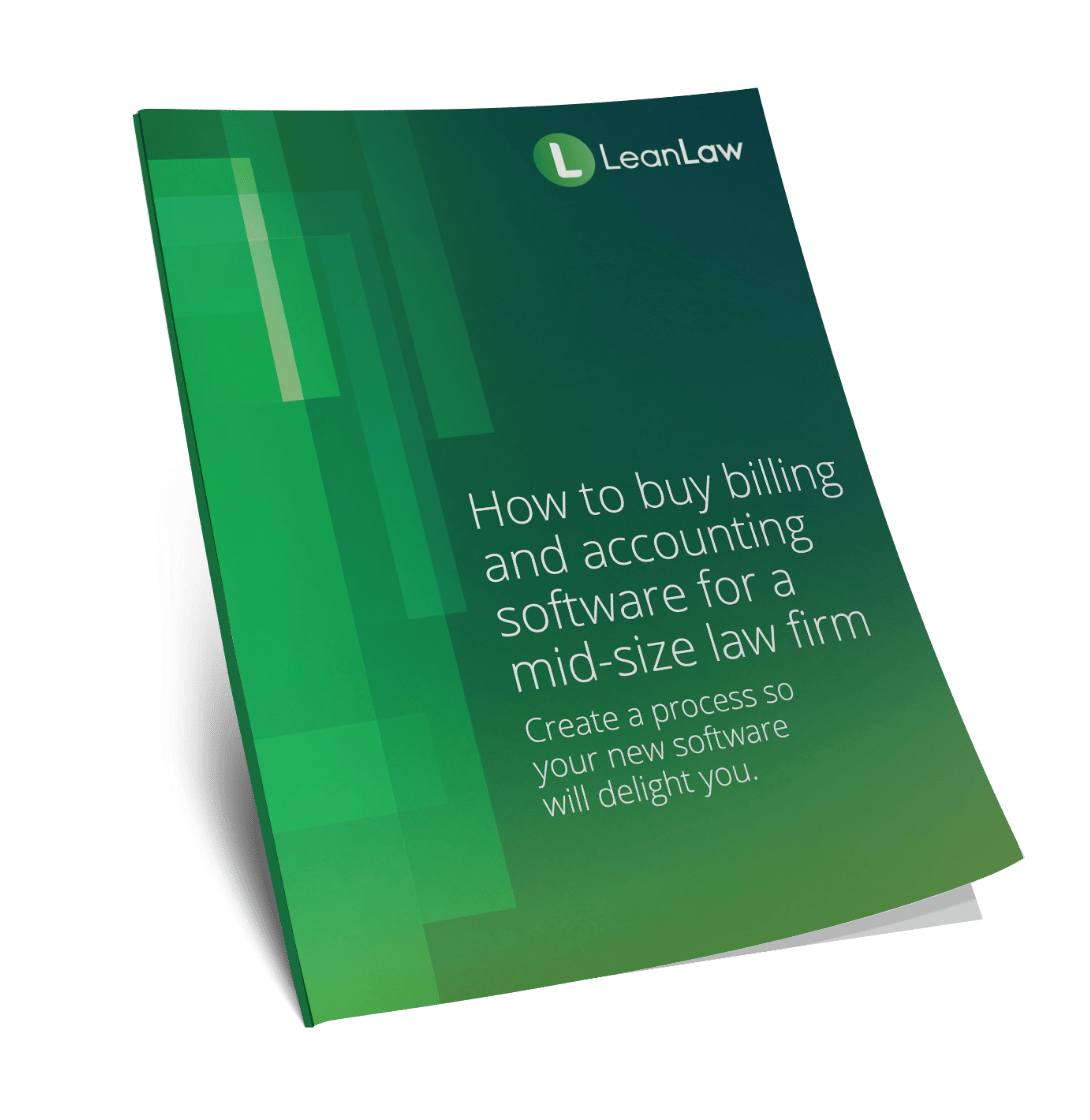
Law school is all about learning terminology.
From torts to contracts, legal schools introduce a plethora of specialized terms and concepts that must be learned, understood and mastered for any law student to become a successful lawyer.
That said, one set of terminology that is usually not taught in law school but is crucial to a firm’s long-term success has to do with accounting – otherwise known as “the business side of things.”

Key Takeaways
- While lawyers are trained in the intricacies of the law, they may not receive extensive education on financial management and accounting principles specific to running a law firm.
- Even if a lawyer or law firm has billing and accounting experts to take care of the business side of things, knowing certain accounting terminology will be beneficial to a firm’s success in the long run.
- Trust accounting is a specific type of legal accounting and has certain terms that need to be defined and understood in order for a firm to make sure they are compliant and can accurately manage client funds.
Understanding accounting terminology and concepts is essential for making informed decisions, managing finances effectively, and ensuring compliance with legal and ethical obligations.
From profit and loss statements to balance sheets and cash flow management, having a solid grasp of accounting terminology empowers law firms to make sound financial decisions and maintain a healthy financial position.
Trust accounting is a specific type of legal accounting and serves as a fundamental component of running a legal practice, particularly for firms that handle large amounts of client funds.
Trust accounting involves managing and tracking financial transactions related to client trust accounts, while also ensuring that funds are safeguarded and properly allocated.
While trust accounting may seem complex and unfamiliar to a practicing lawyer, gaining a solid grasp of the terminology and principles associated with it will make a big difference in how you understand the financial aspects of your firm and how you build trust and communications skills with your clients.
Let’s spend some time demystifying trust accounting for law firms by defining some of the key terms and answer some of the most common questions that arise when it comes to client funds and trust accounts for law firms.

What is the Difference Between a Law Firm’s Operating Account and a Trust Account?
Trust accounting is a specialized branch of accounting that pertains to the handling and management of client funds by law firms.
It involves the diligent tracking and safeguarding of client funds that have been entrusted to a firm for any number of reasons.

Most simply put, trust accounts are bank accounts, specifically (and only) for client funds.
These funds may include retainers, settlements, advances, or any money held on behalf of clients.
The primary purpose of trust accounts is to maintain the integrity and separation of client money from the firm’s own finances.
By law, lawyers have a fiduciary duty to handle client funds with the utmost care and act solely in the best interests of the clients.
On the other hand, operational accounts are used to manage the law firm funds used for day-to-day expenses, such as salaries, rent, and utilities. These accounts typically consist of the firm’s own funds, including revenue generated after certain legal services are provided by the firm.

Trust accounting differs from operational accounting in several key ways.

First, trust accounting requires meticulous record-keeping and detailed transaction tracking specific to each client. This includes maintaining a separate ledger for each client’s trust funds, recording deposits, withdrawals, and any interest earned. Accuracy and transparency are paramount in trust accounting to ensure compliance with legal and ethical requirements.
Another distinction is the reconciliation process. Trust accounts necessitate regular three-way reconciliation, which involves matching the firm’s internal accounting records, bank statements, and client trust ledgers.
This process helps identify any discrepancies or errors, ensuring that the financial information is accurate and complete. This level of scrutiny is crucial in trust accounting to maintain the highest level of accountability and to promptly address any issues that may arise.
Trust accounting also involves strict compliance with jurisdiction-specific rules and regulations governing the handling of client’s funds. These regulations may vary from one jurisdiction to another, emphasizing the importance of staying informed and up-to-date on the legal requirements applicable to trust accounting.
Trust Accounting: The Most Important Terms Every Attorney Needs to Know

Lawyers spend a good deal of time learning and understanding definitions. And when it comes to legal trust accounting, there are specific terms and concepts that lawyers need to be familiar with in order to navigate this specialized area of accounting.
Understanding these terms is essential for maintaining compliance, ensuring the proper handling of client funds, and avoiding potential ethical and legal pitfalls.
Here are some of the most important terms to know:
- Trust Account: A designated account used by a law firm to hold client funds separately from the firm’s operational accounts. It ensures the proper segregation and safeguarding of client funds.
- Client Funds: Money received by the law firm on behalf of clients, including retainers, settlements, advances, or any funds held for specific legal purposes.
- Trustee: The law firm or attorney responsible for managing and administering the trust account and handling client funds in accordance with legal and ethical obligations.
- Fiduciary Duty: The legal and ethical obligation of the law firm or attorney to act in the best interests of the client, maintain confidentiality, avoid conflicts of interest, and handle client funds with the utmost care and diligence.
- Three-Way Reconciliation: The process of reconciling the law firm’s internal trust accounting records, bank statements, and client trust ledgers to ensure accuracy and identify any discrepancies or errors.
- Commingling: The improper mixing of client funds with the law firm’s operational funds or personal funds. Commingling is strictly prohibited as it violates trust accounting principles and can lead to ethical and legal consequences.
- Retainer: An upfront fee paid by the client to secure the services of the law firm. Retainers are typically deposited into the trust account and are used to cover future legal fees and expenses.
- IOLTA (Interest on Lawyers’ Trust Accounts): A type of interest bearing trust account where the interest earned on client funds is used for charitable purposes, typically to fund legal aid programs or improve access to justice.
- Disbursements: Payments made from the trust account to third parties on behalf of clients, such as court fees, expert witness fees, or settlement payments.
- Audit Trail: A detailed record of all transactions and activities within the trust account, providing a clear and transparent history of funds received, disbursed, and any interest earned.
- Compliance: The adherence to jurisdiction-specific rules, regulations, and ethical guidelines governing trust accounting. Compliance ensures that the law firm operates within the legal framework and upholds its fiduciary duty to clients.
It’s important to note that these definitions may vary slightly depending on your jurisdiction.
But, for the most part, making sure that every attorney (and the relevant staff member) in your firm knows these terms will make your trust accounting management significantly easier and will help to ensure your compliance is up-to-date and accurate as well.
Trust Accounting Software: Do You Need it for Your Trust Account Management?
Learning the terms and definitions for various aspects of good trust account management is one thing.
But putting all those terms and definitions into practice is another.
The responsibility of handling client funds, complying with regulatory requirements, and maintaining accurate records requires meticulous attention to detail.
In today’s digital age, many law firms are turning to trust accounting software as a valuable tool to streamline their trust account management processes.


Step-By-Step Process for Attorneys & Law Firmsto Buy Law Firm Software
Understand who needs what and prioritize features as you investigate new software. Download Buyers Guide eBookBut how do you know if your firm needs trust accounting software?
Consider the following factors:
Volume and Complexity: If your law firm handles a large volume of trust transactions or deals with complex financial arrangements, trust accounting software can be highly beneficial. It automates and simplifies many manual tasks, such as recording transactions, generating reports, and reconciling accounts, all while saving valuable time and reducing the risk of errors.
Schedule a demo
Compliance and Audit Trail: Trust accounting software provides built-in compliance features that help ensure adherence to trust accounting rules and regulations. It enables you to track and document every transaction, maintain an accurate audit trail, and generate reports that demonstrate compliance during audits or inspections.
Efficiency and Accuracy: Trust accounting software also streamlines processes, automates calculations, and reduces the chance of human error. It enables efficient management of client trust account funds, facilitates timely disbursements, and maintains accurate and detailed records. By eliminating manual tasks and reducing the risk of mistakes, it enhances the overall efficiency and accuracy of trust account management.

Reporting and Analysis: Trust accounting software is also a great way to get the reporting you need to ensure the financial health of your trust accounts. It allows you to generate customized reports, track financial performance, and analyze trends. These reports can be valuable in making informed decisions, assessing profitability, and ensuring the financial stability of your trust accounts.
Integration with Other Systems: If your law firm uses other software solutions, such as matter management or document management software, it’s essential to consider the benefits of trust accounting software that can seamlessly integrate with these systems. Integration eliminates data entry duplication, enhances data accuracy, and improves overall workflow efficiency.
LeanLaw: the Trust Accounting Software that Law Firms Prefer
When it comes to trust accounting software, LeanLaw stands out as a top choice for law firms everywhere.
With its robust features, intuitive interface, and seamless integration with QuickBooks Online, LeanLaw offers a comprehensive solution for efficient and compliant trust account management.
Are you interested to see how LeanLaw can help your firm stay in compliance with industry practices while also streamlining and automating many of your manual (and highly necessary!) trust accounting tasks?
Then reach out for a free demo today.



